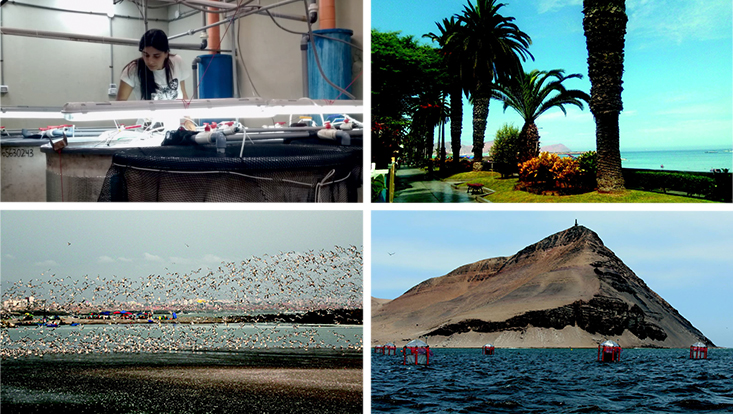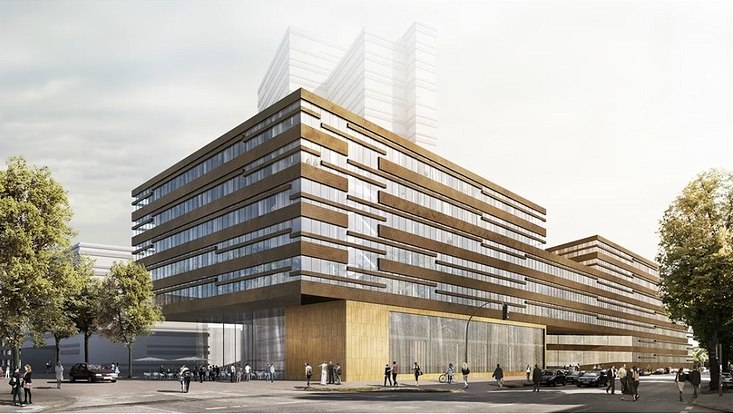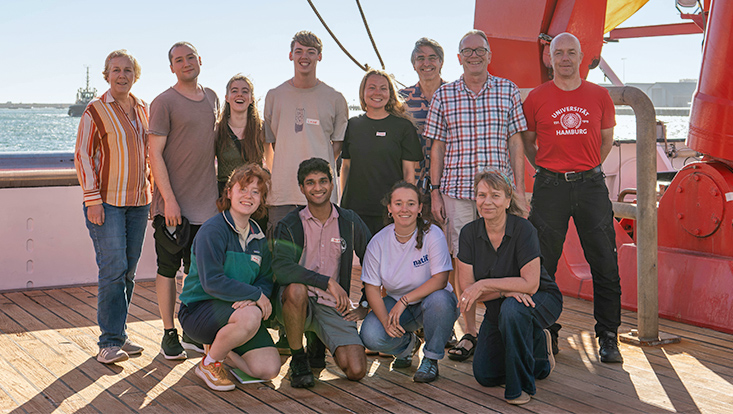KOSMOS 2020
30. November 2020, von Website Team Biologie

Foto: UHH/IMF
It cannot get worse is a common saying, but we have never heard it as often as during the last 6 weeks staying in La Punta, Peru. It already started with the fact that our containers got stuck in customs and we only got them handed over after several weeks…
The mesocosm experiment was aiming to indicate the relevance of upwelling intensities on a winter community (low light) and a summer community (high light) for trophic transfer efficiency in the Humboldt Upwelling System. Light and upwelling intensity might be the major driver of productivity and were therefore planned to be manipulated during the experiment using 9 mesocosms. The Universität Hamburg was responsible to work on fish larvae (Claudia Ofelio) and on gelatinous zooplankton (Dominik Auch).
It was planned that we introduce two species of fish into the mesocosms: a coastal demersal fish, the Peruvian grunt, and the Peruvian anchovy, one of the most abundant and important small pelagic fish in the world. The fish work started immediately after our arrival. On the other side of La Punta, the zooplankton team was organizing the lab facilities in the Club Nautico. After taking some initial samples we could go ahead with the deep-water addition.
Looking into the first zooplankton samples Dominik realised that apart from a few Polychaetes there were hardly any gelatinous or semi-gelatinous community in the samples. It was decided to filter all mesocosms with a 1mm mesh because during the deployment some unfiltered water was intruding into some of the mesocosms. Screening a little of the removed biomass Dominik found probably the last hydrozoans removed from the mesocosms. After the third zooplankton sampling day we gave up sampling gelatinous organisms since there were not enough species to get meaningful stable isotope samples. At this point Dominik was considering to leave Peru early but decided to stay and help out, especially with the fish larvae experiments.
The fish were growing well and they were big enough to be transferred into their new house. The juveniles of the two fish species have been introduced into the mesocosmson on the planned day. However, fish larvae that were kept in the experimental tanks have not been so lucky, and experiments had to be stopped immediately. The sampling was reduced at the minimum and we could, at least, accomplish some of the objectives of the expedition.
At that time, very few cases of Corona were reported for Peru. Nevertheless, the government already sent first signs of strict and early measurements against Corona by closing kindergartens and schools. A few days later, it turned out that upcoming restrictions would mean a quarantine for everyone for 15 days, allowing us to go out only for food supply and medication. Furthermore, flights between Europe and South America were stopped until April 16. We tried to getting places in the evacuation program of Germany and checking updates about the situation on an hourly base. First evacuation flights for Spanish people were canceled at the day of the flight since Lima was closing down the airport entirely.
During these days of news changing between progressing and standstill the Club Nautico, the place where most people were had set up their working space, was closed without any time to react. That meant that not only working was further restricted but also packing our equipment became a matter of impossibility. All remaining work, including the sampling was now based at the IMARPE.
When things turned back to normal, we finally received the message at 5pm that we might be on the flight starting the next day. When we finally got confirmation about a flight back we quickly packed our suitcases and waited for further information. It took loads off our minds that this whole chaos was finally coming to an end. We will probably not be back soon in Peru. This is a pity on the one hand, because this is certainly a very beautiful country, of which we have unfortunately not seen much. On the other hand we are very happy to be back in Hamburg.


